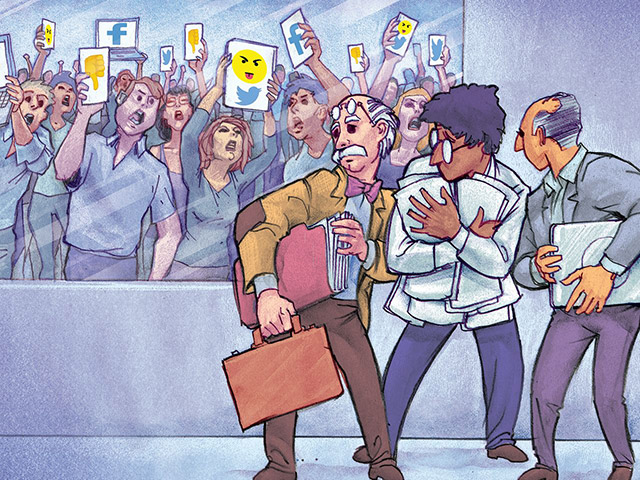How modern technologies lead
In 2019, the governor of Alabama resigned because 52 years ago, he appeared on stage during a school performance in a black mask, and the “character” he embodied had some negative traits. So he is a racist. One of Boeing’s top executives was fired last year for writing an article in 1987 proving that women should not serve as military pilots. Therefore, he hates women. Also in 2020, a professor at the University of Southern California was temporarily deprived of his right to teach because (note) he uttered a word in Chinese during a lecture that sounded like the n-word. Therefore, he is a racist again.
Read also
I started specifically with American rather than Armenian examples to show that the phenomenon I am going to write about is not local, but global. We are talking about the forms of restriction of freedom of speech and thought used in the 21st century, which are different from the direct barriers used in totalitarian, authoritarian countries, but in their meaning and impact are comparable to those barriers. As I mentioned in the previous article, there are people and groups on the Internet who naturally or purposefully try to close a topic or ban an opinion by tagging this or that unpleasant discussion or thought. For example, a misogynist or a racist.
For simplicity, I will also bring a local example. If, for example, I offer to discuss the actions of the Armenian Secret Army and find out which of them were justified and which were not, which harmed not only Turks but also foreigners, can you imagine the reactions, say, on Facebook? Hundreds of people will write that I am a Turk, a spy for Turkey, a traitor to the nation and an enemy, a blasphemer and an insult to the memory of the victims of the Armenian Genocide. If I write that in 1991-2018, in addition to the theft, there were also positive, bright things in our country, then I am “pro-Levon” or “pro-Serzh.” And if I say that in these three years, in addition to the painful defeat, there are also positive things, I will, of course, be “Nikol’s supporter.”
It is based on a simple psychological mechanism. We all have emotions, and we can not ignore them in our judgments. The question is, do our emotions claim to be universal? Or do we, nevertheless, connect the intellect and realize that these are only our emotions and do not apply to “the common people,” “all honest people,” or “all humanity”? As soon as we do this simple action and realize that our emotions are not “normative,” they are only a “special case,” we a) begin to understand that there may be other people with different emotions, b) try to analyze every phenomenon from different angles.
The goal of preachers of all times and of all kinds is, of course, to turn off people’s brains and excite their emotions. And here come to the aid of various tools, of which I will single out four. 1) populism, 2) “political correctness,” 3) the formation of artificial identity groups, 4) what is called “cancel culture” in English – a culture of rejection, cancellation.
- Populism is a system of tricks that involves easy solutions to complex problems. Of course, the digital age contributes to the multiplication of such “easy” solutions, when you come across thousands of links that promise to resolve this or that issue very quickly: “English in 5 days,” “know your mission in life through a test,” “Hegel’s philosophy in two pages.” When we do not know the answer to this or that question, it seems to us that Google or Wikipedia will help us, and the instantaneous “knowledge” will be imprinted in our brain. This “easy” culture merges with “traditional” populism: “let’s shoot a few people and start living happily,” “take money from the rich, distribute it to the poor (or buy weapons with it).” Millions of people continue to live with these illusions in the 21st century.
- “Political correctness” implies that there are some “evil,” “cursed” words that will cause the world to explode when uttered. Suppose the “n-word” cannot be said. But if you ask some people, the words “woman” and “man” should be avoided, because they are only related to the X and Y chromosomes, and the rest is “talking,” and therefore there are not 2, but 8-10 genders. And the important thing is that it is put forward not as a hypothesis or an opinion, but as a final fact, a law from which one can not deviate even one centimeter.
- The real identity is first of all of a national nature. Our identity as Armenians has been formed over millennia and is based on a unique historical, religious, and cultural development. It is also based on individuals. The famous French chemist Louis Pastor said: “If you removed 100 names from France (meaning people of science and culture – AA), France would never exist. Other identities, including those within the nation, are questionable to me.” The first president of Armenia Levon Ter-Petrossian said at the February 9th rally in 2008, “This rally and march showed that the watershed is clearly delineated: on the one hand, there are dignified, free, brave, heroic citizens, the Armenian people, on the other hand, there is the scum of the nation.” That is, the nation is divided into two identities, two groups: A (white) and B (black), but C, D, E, and other options are excluded. You are required to identify with either group A or group B. It is clear that this is the logic of the political struggle. But any such division, even when it is made by an authoritative person like Ter-Petrossian, is artificial. The criteria for a “watershed” are fluid and subjective.
- I have given examples of cancel culture at the beginning of the article. Again, in the face of Facebook reality, where there is no hierarchy of awareness and reasoning, Copernicus, who believed that the Earth revolved around the Sun, would be “ostracized” by the majority, who believed that the Earth was at the center of the universe.
And at the end another quote. “Intellectual violence, by imposing a certain form and direction of thinking on rational beings, mutilates them not only mentally, but also spiritually.” The author of that idea, imagine, is Garegin Nzhdeh.
Aram Abrahamyan























































